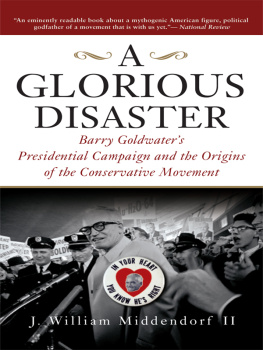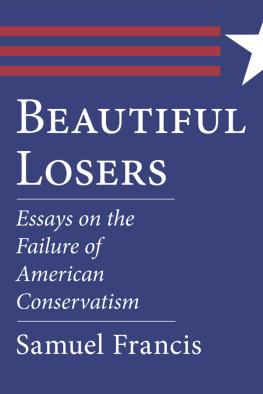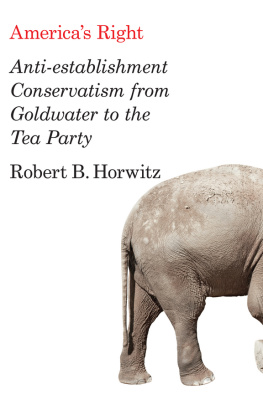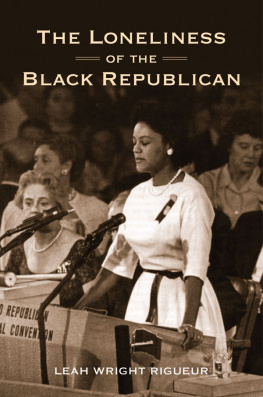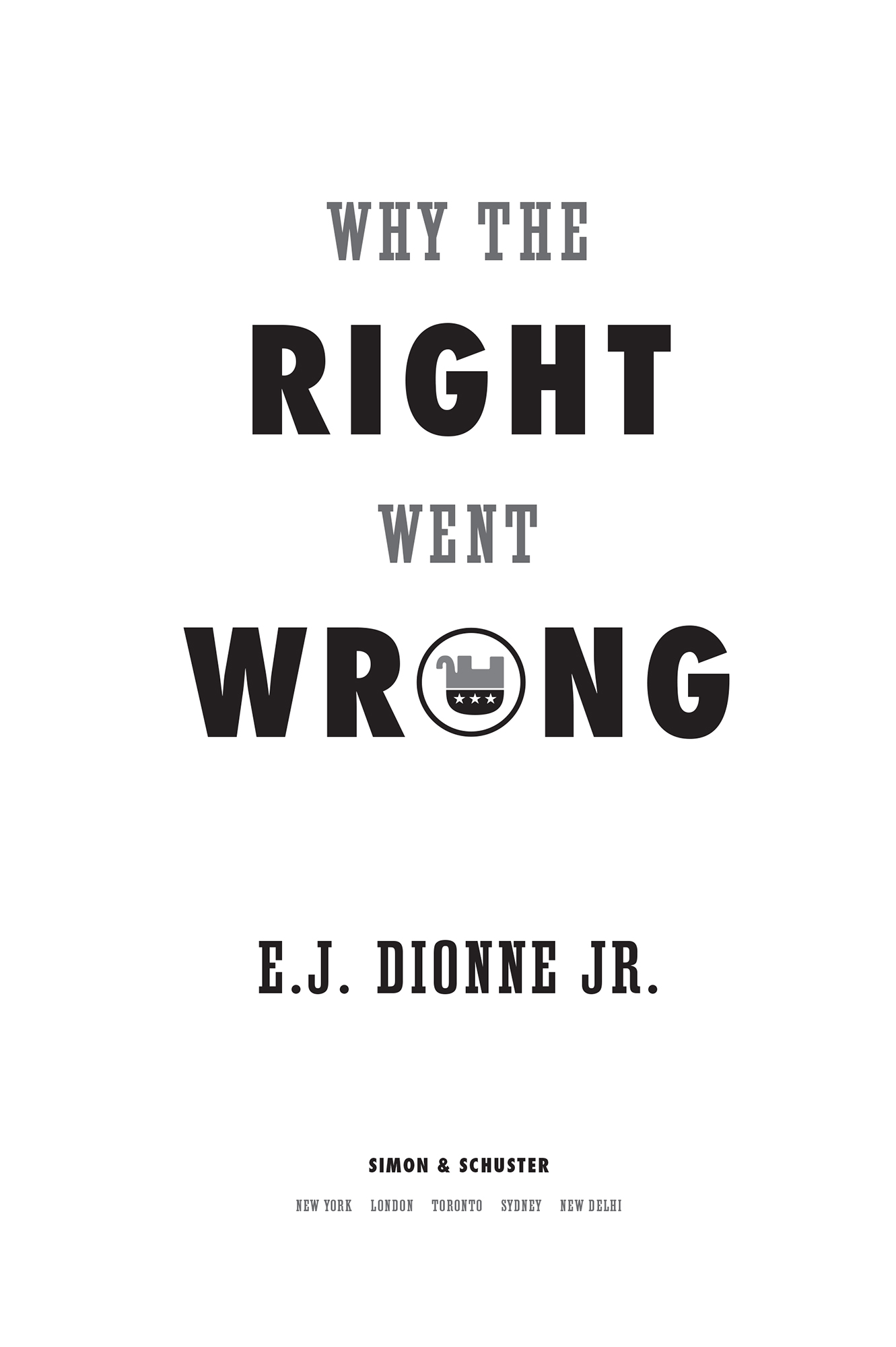Thank you for downloading this Simon & Schuster eBook.
Join our mailing list and get updates on new releases, deals, bonus content and other great books from Simon & Schuster.
C LICK H ERE T O S IGN U P
or visit us online to sign up at
eBookNews.SimonandSchuster.com
We hope you enjoyed reading this Simon & Schuster eBook.
Join our mailing list and get updates on new releases, deals, bonus content and other great books from Simon & Schuster.
C LICK H ERE T O S IGN U P
or visit us online to sign up at
eBookNews.SimonandSchuster.com
ALSO BY E.J. DIONNE JR.
Our Divided Political Heart: The Battle for the American Idea in an Age of Discontent
Souled Out: Faith and Politics After the Religious Right
Stand Up Fight Back: Republican Toughs, Democratic Wimps and the Politics of Revenge
They Only Look Dead: Why Progressives Will Dominate the Next Political Era
Why Americans Hate Politics

Simon & Schuster
1230 Avenue of the Americas
New York, NY 10020
www.SimonandSchuster.com
Copyright 2016 by E.J. Dionne Jr.
All rights reserved, including the right to reproduce this book or portions thereof in any form whatsoever. For information, address Simon & Schuster Subsidiary Rights Department, 1230 Avenue of the Americas, New York, NY 10020.
First Simon & Schuster hardcover edition January 2016
SIMON & SCHUSTER and colophon are registered trademarks of Simon & Schuster, Inc.
For information about special discounts for bulk purchases, please contact Simon & Schuster Special Sales at 1-866-506-1949 or .
The Simon & Schuster Speakers Bureau can bring authors to your live event. For more information or to book an event, contact the Simon & Schuster Speakers Bureau at 1-866-248-3049 or visit our website at www.simonspeakers.com.
Interior design by Ruth Lee-Mui
Jacket design by Heads of State
Library of Congress Cataloging-in-Publication Data
Names: Dionne, E. J., author.
Title: Why the right went wrong : American conservatismfrom Goldwater to the Tea Party and beyond / E.J. Dionne, Jr.
Description: First Simon & Schuster hardcover edition. | New York : Simon & Schuster, [2016] | Includes bibliographical references and index.
Identifiers: LCCN 2015027336
Subjects: LCSH: ConservatismUnited StatesHistory.
Classification: LCC JC573.2.U6 D57 2016 | DDC 320.520973dc23 LC record available at http://lccn.loc.gov/2015027336
ISBN 978-1-4767-6379-8
ISBN 978-1-4767-6381-1 (ebook)
For Alice Mayhew
CONTENTS
INTRODUCTION
What Happened to Conservatism?
Why Reforming the Country Requires Transforming the Right
The history of contemporary American conservatism is a story of disappointment and betrayal. For a half century, conservative politicians have made promises to their supporters that they could not keep. They offered stirring oratory that was not commensurate to what was possible. They described a small government utopia that was impractical and politically unsustainable because it required wrenching changes to government that most Americans didnt want. They denounced decades of change, pledging what amounted to a return to the government and the economy of the 1890s, the cultural norms of the 1950s, and, in more recent times, the ethnic makeup of the country in the 1940s. This proved to be far beyond the capacity of politics. Most Americansincluding a great many who were neither very liberal nor radical, and especially the youngdid not want to go back.
Conservatives have won many elections since their movement began to take control of the Republican Party more than a half century ago. But these victories produced neither the lasting electoral realignment that conservative prophets kept predicting nor the broad policy changes the faithful hoped for. For the rank-and-file right, the sense that their leaders had failed them and the political system had shortchanged them created a cycle of radicalization. We are living with its fruits today.
The Trumpification of Republican politics during the summer of 2015 provided gaudy confirmation that something is amiss. Its true that Donald Trumps unlikely insurgency reflected the complete fusion of the culture of celebrity with politics that the billionare builder, television star, birther, and self-promoter perfected. His rise could certainly be seen as part of a distemper that bred a mood of anti-Establishment protest across the worlds democracies. But the deeper ideological force behind Trumpism is rooted in history. It was compactly summarized by Erick Erickson, editor of the popular right wing blog RedState. The Republican Party created Donald Trump, he said, because they made a lot of promises to their base and never kept them.
It is a problem that goes a long way back. Since 1968, no conservative administrationnot Richard Nixons, not Ronald Reagans, and neither of the Bush presidenciescould live up to the rhetoric conservative politicians deployed to rally their supporters. Their appeals were rooted in the aspirations of the Goldwater movement that began reshaping American politics fifty years ago. The hopes Goldwater inspired were regularly frustrated. In response, movement conservatives advanced an ever purer ideology, certain that doing so would eventually bring them the triumphs that had eluded them over and over.
Consider the steady march rightward. The collapse of the Nixon presidency led to the rise of Ronald Reagan. The defeat of George H. W. Bush led to Newt Gingrichs revolution. The reelection of Bill Clinton pushed Republicans to impeach him. The partial exception to this pattern is George W. Bush. Yet by the time his second term was over, the cycle reasserted itself as his failures led to the rise of the Tea Party.
The second President Bush initially undertook a partial modernization of the right, preaching compassionate conservatism and seeking, in effect, a Fourth Way in response to Clintons Third Way between left and right. But Bushs modernization project was incomplete, in many ways superficial, and short-lived. After carefully examining the reasons behind Bushs loss of the popular vote in 2000, Karl Rove, the architect of Bushs victories, concluded that moderation was a less effective political tactic than rallying the conservative faithfuland two wars eventually engulfed the administration, creating new sources of radicalism around national security questions and, for some on the right, attitudes toward Muslims.
Bushs difficulties, of course, might have led to a search for a more moderate conservatism. Instead, conservatives quickly defined Bush as an advocate of big government whose failures owed to his refusal to be conservative enough on spending, immigration, education, and Medicare. A return to the true faith was the only prescription on order. The result was the Tea Party, which was as much a reaction to Bush as to the election of Barack Obama. The long journey to the right continued.
This process has been self-reinforcing. The rise of cultural and religious conservatism, along with the emergence of the white South as the central pillar of the Republican Party, called forth a counter-realignment. As middle-of-the-road and progressive Republicans outside the South fled the party, it lost voters and leaders who would have supported moderate or moderately conservative candidates in primaries. The numbers tell the story: between January 1995 and January 2015, the proportion of Republicans who called themselves very conservative nearly doubled, from 19 percent to 33 percent. When even Eric Cantor, the very conservative former House majority leader, could be felled in a primary for being insufficiently faithful to the ideas of the right, no Republican could feel truly safe from challenge.
Next page

